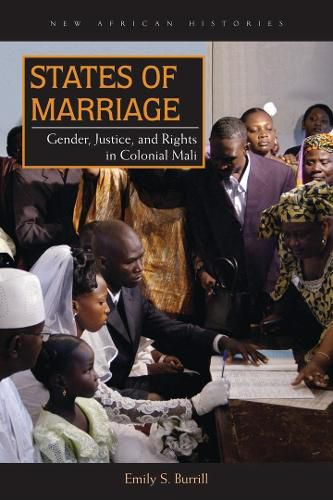Readings Newsletter
Become a Readings Member to make your shopping experience even easier.
Sign in or sign up for free!
You’re not far away from qualifying for FREE standard shipping within Australia
You’ve qualified for FREE standard shipping within Australia
The cart is loading…






A theoretically sound, gender-specific legal history through the reading of civil and criminal court records on marriage disputes in Sikasso, Mali…The book echoes the original contribution of Nkiru Nzegwu (in Family Matters, 2006) that the oppression and exploitation of women were at the center of colonial policy. Burrill analyzes this history of legalized oppression at the local, national, and transnational levels…Summing up: Recommended. -CHOICEStates of Marriage shows how throughout the colonial period in French Sudan (present-day Mali) the institution of marriage played a central role in how the empire defined its colonial subjects as gendered persons with certain attendant rights and privileges. The book is a modern history of the ideological debates surrounding the meaning of marriage, as well as the associated legal and sociopolitical practices in colonial and postcolonial Mali. It is also the first to use declassified court records regarding colonialist attempts to classify and categorize traditional marriage conventions in the southern region of the country. In French Sudan, as elsewhere in colonial Africa, the first stage of marriage reform consisted of efforts to codify African marriages, bridewealth transfers, and divorce proceedings in public records, rendering these social arrangements legible to the colonial administration. Once this essential legibility was achieved, other, more forceful interventions to control and reframe marriage became possible. This second stage of marriage reform can be traced through transformations in and by the colonial court system, African engagements with state-making processes, and formations of gender justice. The latter refers to gender-based notions of justice and legal rights, typically as defined by governing and administrative bodies as well as by sociopolitical communities. Gender justice went through a period of favoring the rights of women, to a period of favoring patriarchs, to a period of emphasizing the power of the individual - but all within the context of a paternalistic and restrictive colonial state.
$9.00 standard shipping within Australia
FREE standard shipping within Australia for orders over $100.00
Express & International shipping calculated at checkout
A theoretically sound, gender-specific legal history through the reading of civil and criminal court records on marriage disputes in Sikasso, Mali…The book echoes the original contribution of Nkiru Nzegwu (in Family Matters, 2006) that the oppression and exploitation of women were at the center of colonial policy. Burrill analyzes this history of legalized oppression at the local, national, and transnational levels…Summing up: Recommended. -CHOICEStates of Marriage shows how throughout the colonial period in French Sudan (present-day Mali) the institution of marriage played a central role in how the empire defined its colonial subjects as gendered persons with certain attendant rights and privileges. The book is a modern history of the ideological debates surrounding the meaning of marriage, as well as the associated legal and sociopolitical practices in colonial and postcolonial Mali. It is also the first to use declassified court records regarding colonialist attempts to classify and categorize traditional marriage conventions in the southern region of the country. In French Sudan, as elsewhere in colonial Africa, the first stage of marriage reform consisted of efforts to codify African marriages, bridewealth transfers, and divorce proceedings in public records, rendering these social arrangements legible to the colonial administration. Once this essential legibility was achieved, other, more forceful interventions to control and reframe marriage became possible. This second stage of marriage reform can be traced through transformations in and by the colonial court system, African engagements with state-making processes, and formations of gender justice. The latter refers to gender-based notions of justice and legal rights, typically as defined by governing and administrative bodies as well as by sociopolitical communities. Gender justice went through a period of favoring the rights of women, to a period of favoring patriarchs, to a period of emphasizing the power of the individual - but all within the context of a paternalistic and restrictive colonial state.